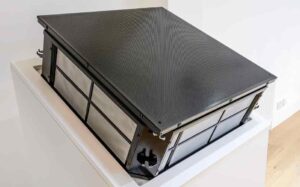Study sees fridge doors as sales barrier
28th March 2018UK: Initial studies carried out by one of the UK’s leading shopper research companies has revealed that doors on supermarket refrigerators do inhibit shoppers.
While it’s argued that doors on supermarket fridges save energy and, consequently, are more environmentally-sound, some retailers maintain that they act as a barrier to sales.
In this latest round of the doors/no-doors debate, Shopping Behaviour Xplained Ltd (SBXL) carried out in-store filming research over a number of chilled dairy aisles in 2017. The results are supplemented by the company’s shopper behaviour database of over 65,000 shoppers.
“A common question we get from clients working in chilled categories is ‘do shoppers avoid the aisle because it’s cold?’,” said SBXL insights manager Will J Morgan. “As shoppers, we may tell researchers that we don’t like the cold, but it certainly doesn’t stand in the way of us buying our chilled food.
“Fridge doors are the simplest way to target this phantom avoidance behaviour, but at great expense to the retailer. Operationally, chiller doors are a natural means to cut running costs and benefit the environment. But what gets forgotten in the cost equation however, is the impact on shopper behaviour. The evidence so far is mixed as to what effect it has,” Morgan adds.
To shed some light on the argument, SBXL conducted in-store filming research over a number of chilled dairy aisles last year.
“We started out at a macro level, looking at what the customer has in their hands when they arrive at the chiller doors,” Morgan explains. “Supermarkets tend to be quite trolley-focused, particularly in a big-shop category such as chilled food. Convenience, however, is much more focused around baskets or no carrier at all. But how do shoppers open a fridge door, and choose a product if their hands are full?”
One of the biggest differences in behaviour observed was the impact of doors on detailed pack reading. On average, 31% of chilled shoppers read packs in detail but this dropped to around 9% in stores with fridge doors.
“Whilst pack-reading does not always lead to sales, we do see on average around 10% more chilled buyers will read a pack than non-buyers,” Morgan reveals. “This also impacts launching new products in a store with fridge doors. Pack reading is far more important for a new product, but our data indicates this won’t happen to the same degree.”
So what impact do fridge doors have on the conversion of shoppers into buyers in chilled categories? “Our research shows that the amount of shoppers going on to buy decreased on average by 29%, leaving only around one in every two shoppers purchasing.”
Shopper behaviour
In their film research, SBXL looks for five different kinds of behaviour: inexperienced, considered, experiential, grab & go, and impulse.
“Fridges with doors see grab and go levels decrease by 13%,” says Morgan. “In many ways this could be viewed as a positive as it’s slowing shoppers down. But if they’re less likely to read, and less likely to buy, we’d argue more could be done to use this slower behaviour.”
The company also looked at the impact of store atmospherics in chilled categories, and found that the perception of temperature can be down to something as simple as the colour of the aisle or flooring.
“We tested two dairy aisles with a similar ambient temperature, and asked shoppers what they thought of the aisle. The twist was that one aisle had black shelves, and the other had white shelves.” It was found that shoppers were far more likely to describe the whiter/lighter aisle as cold than the darker aisle.
“We’re currently undertaking research to understand how many perceived degrees Celsius we can change without altering the actual temperature of an aisle.”
Will J Morgan believes that the future is more efficient, environmentally friendly fridges, that don’t have doors to inhibit behaviour.
“However, it still isn’t the end of days for fridges with doors,” he says. “We can still bring in more psychology to help them become more shopper friendly.”
SBXL is looking to build on this initial research and is currently looking for a research partner in order to test more stores, more variables, and more shoppers.
“We want to not only guide the fridge of tomorrow, but improve the psychology of current in-store fridge/freezer designs,” says Will J Morgan.
SBXL can be contacted on 01543 255259.








